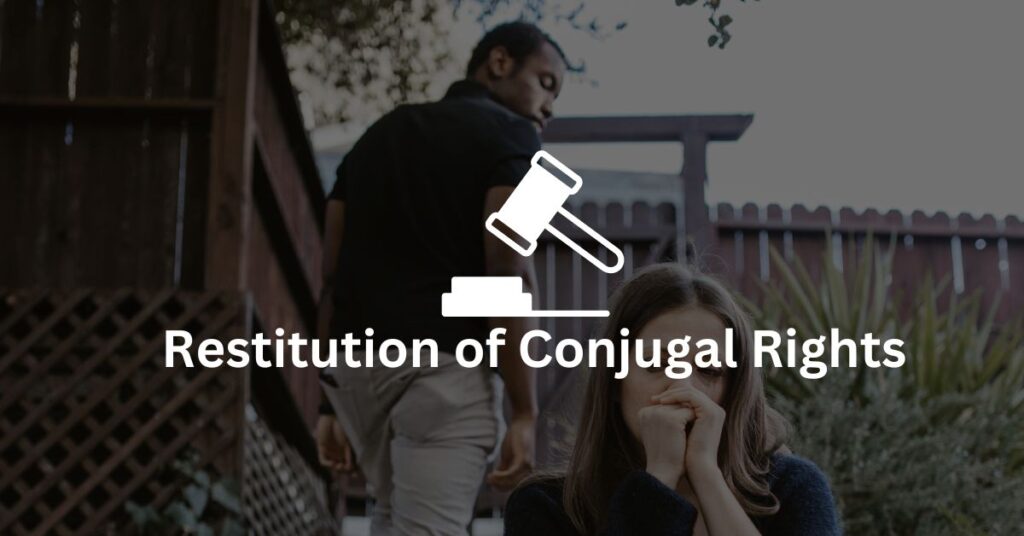
In the context of marriage in India, the concept of restitution of conjugal rights holds significant importance. It refers to the legal remedy available to a married individual whose spouse has unreasonably withdrawn from the marital home. This article aims to provide an in-depth understanding of restitution of conjugal rights in India, including its legal provisions, cultural perspectives, challenges, and alternatives.
Table of Contents
Conjugal rights in the Indian context encompass the rights, obligations, and privileges that spouses have within a marriage. These rights are not only limited to physical intimacy but also encompass emotional support, companionship, and financial responsibilities.
In India, conjugal rights are deeply rooted in cultural and societal norms. Traditional Indian values emphasize the importance of marriage as a sacred institution and place a strong emphasis on marital obligations and commitment.
In India, section 9 of the Hindu Marriage Act, 1955, provides provisions for restitution of conjugal rights for Hindu couples. Similar provisions may exist under personal laws applicable to different religious communities, such as the Divorce Act, 1869 for Christian couples or the Parsi Marriage and Divorce Act, 1936 for Parsi couples or the Special Marriage Act, 1954 for couples of different religion.
A spouse seeking restitution of conjugal rights must file a petition before the appropriate family court. The court will have jurisdiction based on the place of marriage or the place where the respondent resides. The petitioner must follow the procedural requirements outlined under the specific personal law applicable to them.
In India, abandonment occurs when one spouse leaves the matrimonial home without any reasonable cause. Desertion refers to the continuous absence of one spouse from the marital home without the consent of the other. These grounds can be invoked to seek restitution of conjugal rights.
The refusal of a spouse to cohabit or fulfill their marital duties, including physical intimacy, may also serve as grounds for seeking restitution of conjugal rights. This can be a complex issue influenced by cultural and religious beliefs.

The petitioner filing a petition for restitution of conjugal rights in India has the right to request the court’s intervention to restore the marital relationship. They must provide evidence to support their claim and demonstrate that the respondent has unjustifiably withdrawn from the matrimonial home.
The respondent has the obligation to respond to the petition and present their case before the court. They may raise defenses such as cruelty, adultery, or any other valid reason for their withdrawal from the matrimonial home.
Indian courts often encourage mediation and conciliation between the parties involved in restitution cases. The court may refer the couple to family counseling services or attempt to resolve the dispute amicably, with the aim of preserving the marital bond.
Courts in India face the challenge of balancing individual autonomy and personal freedom with the institution of marriage and the concept of conjugal rights. They must consider the welfare of both parties and explore the possibility of reconciliation while ensuring that individual rights are not unduly compromised.
Critics argue that restitution of conjugal rights in India can perpetuate gender inequalities and lead to the enforcement of oppressive or abusive marriages. They raise concerns about the potential misuse of the provision and the impact on women’s autonomy and well-being.
As societal attitudes towards marriage and relationships evolve, the relevance and effectiveness of restitution of conjugal rights in India come under scrutiny. Many argue for a shift towards empowering individuals to make their own choices and promoting alternative dispute resolution mechanisms.
In situations where reconciliation is not possible or desirable, Indian law provides for legal separation and divorce as alternatives to restitution of conjugal rights. These legal remedies allow individuals to dissolve the marriage or live separately, respectively.
Indian courts actively encourage family counseling and mediation services as alternatives to litigation. These approaches aim to facilitate communication, understanding, and resolution of conflicts, fostering healthier relationships and decision-making.
In India, cultural expectations and gender roles strongly influence the perception and practice of conjugal rights. These expectations may place different responsibilities and obligations on spouses based on societal norms and customs.
With changing times, there is an increasing recognition of individual autonomy and the empowerment of individuals within marriages. Modern perspectives challenge traditional gender roles and emphasize the importance of mutual consent, respect, and equality in marital relationships.
Restitution of conjugal rights in India is a legal remedy available to married individuals when their spouse unjustifiably withdraws from the matrimonial home. While it aims to promote reconciliation and preserve the institution of marriage, there are concerns regarding gender dynamics, individual autonomy, and evolving societal attitudes. Alternatives such as legal separation, divorce, and family counseling provide couples with options to address marital conflicts and make choices based on their specific circumstances.